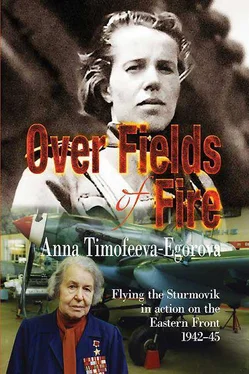The medications I needed were found in the barracks of the French, British and American POWs who had been allowed to get parcels from the Red Cross and from home. Once, a high-ranking SS man who could speak Russian came to see me.
“Rotting away, girl?” he asked me with an insolent grin. I silently turned to the wall. The SS man tapped me on the shoulder with the handle of his rubber knout: “Oh, I’m not angry, kid! We respect the strong”, and, after a silence, added: “A word from you, and tomorrow you’ll be in the best Berlin hospital. And on the day after tomorrow all the newspapers in the Reich will be talking about you. Well?”
“Eh, you beasts! She’s, one might say, at death’s door, and you’ve got only one thing on your mind,” came Yulia’s sonorous voice.
“Shut up, you Russian swine!” The SS man exploded.
“You’re a swine yourself. A German one!”
“You can rot!” the Hitlerite shouted and ran out of the cell.
Later Georgiy Fedorovich came to see us. I told him about the SS man’s visit. “You need to be cunning with the enemy, but you were behaving like silly little kids. I can’t hide it — you are in trouble”, he said, and then I admitted to Sinyakov: “There’s a hiding place in my flying boot. Please, hide my Party membership card and decorations. If you make it back home, hand them over to the proper authorities…”
Sinyakov left, and we began to listen guardedly to every knock and rustle. We were very uneasy. We were silent for quite some time, each busy with our own thoughts. Then, interrupting the silence, I asked Yulia to tell me how she had ended up on the front.
“Very simple”, she began. “As soon as I had graduated from the 7-year school in my village of Novo-Chervonnoye in the Lougansk Region, the war broke out. Our village of Novo-Chervonnoye (near Donetsk) was occupied by the Hitlerites. Oh, it was a terrible time! My mum and I were kicked out of our house, and for a long while we lived in a shed. And when our troops had come back, first of all I grabbed my badge and certificate ‘Ready for Medical Defence’ I’d got while I was still at school, ran to see the unit commander and asked him to take me along with them to the front.
“I can do bandages, take me!” I said.
He said “My girl, what are you talking about? They’ll kill you!”
“No way will they kill me!”
“So how old are you?”
“Seventeen…”
Seventeen-year old Yulia Krashchenko was an army medic. Short and agile, she would rush about battlefields, hurry to any groan, any call of: “Sister! Help!” 170 170 Editor’s note — ‘Sister of Medicine’ is a term for nurse in the Russian language.
It might seem that it was beyond her strength to drag out even one casualty — often a big and heavy man. But she had dragged out more than five and more than ten…
During the forcing of the Southern Bug river the Fascists tried to break the thin river ice and drown her company that was striving to reach the occupied river bank. The bank was steep, the water was cold — and all around her were fire, groans and entreaties: “Sister, help…” Yulia was bandaging wounded men, but dragging them not to the rear but forward: it was impossible to crawl back — the enemy shells had already smashed the ice. She met the dawn of 23 February 1944 on the high bank of the Bug. It was then that Guards Sergeant Y.F. Krashchenko was awarded the medal ‘For Valour. And later, several months after that, a battle broke out on the Vistula river, which had been turned by the Germans into an impregnable defence line. One night a group of Soviet troops crossed the river and consolidated their grip on the opposite bank. Yulia Krashchenko was amongst them. The German artillery battered them incessantly, dozens of Fascist planes bombed the small bridgehead, trying to throw the troops into the Vistula. The company commander was killed but they held on, trying to keep the bridgehead. Like steel wedges, columns of Tigers, Ferdinands and Panthers advanced onto our lines pressed against the Vistula. During all those difficult hours our Air Force was helping the land troops. Yulia didn’t know that up there, in the skies, in a Sturmovik cockpit there was I — a woman with whom a shared misfortune would soon bring her together…
The Fascist tanks flattened the trench in which the medic Krashchenko was dressing the wounded. That’s how she had found herself in captivity. And then, after our conversation with the Gestapo man, towards evening two strong Germans appeared and said, pointing their fingers at Yulia: “Kommen. Schnell, schnell!”
I asked the Hitlerites where and why they were taking the girl? One of them, pressing a finger against his temple, squeezed out: “Pif! Paf!” and off they went.
They locked me inside. Silence. How terrible silence can be… Grief stripped all my strength. I wanted to shut my eyes and not open them again. A condition of extreme apathy twisted my last forces and will into a tight knot. And who knew how it all would have come to had I not sensed the tenfold strong support of friends. The POWs began to demonstrate their sympathy to me by different means, and even through the walls of the casemate I felt their fraternal handshakes. The Englishmen passed me a trench coat and the Poles tailored a jacket ‘in the latest style’ from it; the Yugoslavs found me a warm scarf, and our Russian guys hand-made me slippers out of trenchcoat cloth, with red stars on the toes. Had the camp administration found out about any of these gifts, severe punishment would have befallen the donors. But what is death by shooting against the great force of human solidarity! And the will to live arose in me again. To live so as to see the end of hateful Fascism with my own eyes!
They then banned Sinyakov and Trpinac from treating me, and a traitor with the black eyes of a brigand began to dress my wounds. But my comrades in misfortune didn’t abandon me even then. Miraculously once they passed me a bread ration with a note inside: “Hold on, sister!” That unforgettable bread ration… I won’t enlarge upon what that meagre piece of bread meant back then. He who has been hungry knows, and the one who has never starved — as they say — God forbid! Two hundred grams of ersatz bread and a litre of soup from unpeeled and badly washed turnips — such was the daily ration for the Russian POWs of the ‘SZ’ camp. And a starved man, reduced to dystrophy, had sent me his bread ration…
On one excruciating day of my solitary confinement my attention was attracted by a tall skinny guardsman — a youth of about seventeen. That was not his first day of guard duty, and each time he studied the ‘flying witch’ with unhidden curiosity. I saw that the guard wanted to talk to me but was hesitant. But once, looking back at the door, he produced a wrapper from his pocket, pulled out a piece of pie and actually stepped towards the bunk. Swiftly putting the pie on my chest, he smiled.
“Bitte essen, Russische Frau!” the youth said cordially and went back to his place straightaway. “Bitte…”
“Take it back! I don’t need anything of yours!” I replied more by gestures than by words.
“Nein! Nein! Ich bin Fascisten nicht!” The guard exclaimed and hurriedly began to explain that his mother had come to visit him from the countryside and brought him presents…
It was already January 1945. On the last day of that month Major Ilyin’s 5th Shock Army tanks liberated the accursed camp ‘SZ’, but two days before the arrival of our troops the SS guards drove out of the barracks all those who could still stand on their feet. Only the dying men and some doctors and medics headed by Doctor Sinyakov were left in the camp. Working together, they secretly dug a deep hole under the operating room and hid underneath till the liberation.
Читать дальше












